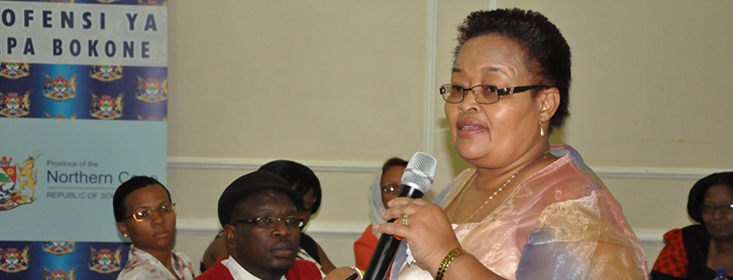 Programme Director
Programme Director
Representatives of Various Organisations Present
Distinguished Guests
Ladies and Gentlemen
I am deeply honoured to participate in this important occasion that aims to encourage and promote collaboration between government and civil society organisations to stem the tide against gender-based violence. I would also like to express my sincere gratitude to the Joint Gender Fund for the commendable work that they are undertaking to strengthen our response to gender-based violence.
Therefore, Programme Director, I am pleased to note that this dialogue seeks to build mutual understandings, drawing on government and civil society perspectives that can feed into strengthening police response towards improving safety for women and girls in communities.
It is therefore befitting that we are meeting today to reaffirm our collective commitment to act against abuse in all its manifestations. Together, we can and must do more to prevent violence against women, provide services to survivors, and ensure that perpetrators are severely punished.
Ladies and Gentlemen, we are aware of the increasing scourge of violent and brutal abuse against our most vulnerable groups in our society: women, children, the elderly and the disabled.
What is very worried is the fact that our country South Africa is one of the countries with the highest rape statistics in the world. Women and children are often brutally raped. Time and again these women are murdered to prevent identification of the perpetrator. If the woman survives, this violation leaves emotional scars for the rest of her & her family's lives.
Gender-based violence, Programme Director, reflects inequities between men and women and compromises the health, dignity, integrity, security and autonomy of its victims. It encompasses a wide range of human rights violations, including sexual abuse of children, rape, domestic violence, sexual assault and harassment, trafficking of women and girls and several harmful traditional practices.
Any one of these abuses can leave deep psychological scars, damage the health of women and girls particularly their reproductive and sexual health, and in some instances, result in death.
Although, it is the responsibility of the police to enforce the rule of law against abuse, rape and molestation of children and women, they need our support. They will not succeed on their own without the necessary intelligence information and support from the community itself to apprehend these monstrous criminals. For, rape, molestation, domestic violence and all other types of gender-based violence always happen in a family house, by neighbours or secluded places.
Another difficulty that rape survivors and their families’ faces, is the sexual violence stigma. Changing attitudes is not easy, and the government alone cannot combat damaging stereotypes around sexual assault. But the government has a critical role to play—law enforcement coupled with effective implementation of laws will help make a dent in misogynist attitudes.
Programme Director,
It is also crucial that this gathering take place now, just a month before we launch the 16 days of No Violence against Women and Children. During this period all South Africans are urged to work together to protect women and children from violence and exploitation. This campaign provides us with a unique opportunity to take stock and renew our commitment to eliminating violence against women and children.
As government, we are fully aware of the need to ensure the protection of the rights to equality, human dignity, privacy and freedom, as well as security of each person in this country as mandated by our constitution. The commitment is also informed by the obligations South Africa has in terms of international instruments for human rights such as the Beijing Platform for Action, Convention on the Elimination of all forms of Discrimination against Women.
While progress has been made in the adoption of laws, much greater action is needed to ensure that laws are enforced and awareness is raised.
Esteemed Guests, we have certainly taken active steps to combat rape in our country, through amongst others the Anti-Rape Strategy; that provides a framework for integrated prevention, support and response services to women and children. These initiatives are especially urgent as gender-based violence is one of the reasons why in many ways HIV and AIDS remain highest among women.
Domestic violence is the most common form of gender-based violence. And this violence is mostly accompanied by widespread irresponsible alcohol abuse and the use of illegal substances.
Our government is committed to the conviction that violence against women and girls is unacceptable and will no longer be tolerated.
Ladies and Gentlemen, our government recognizes that ending gender-based violence will mean changing cultural concepts about masculinity, and that process must actively engage men, whether they are policy makers, parents, spouses or young boys.
Together, we can change deeply rooted attitudes and practices that discriminate against women and girls. And together, we can ensure that all those who respond to violence against women—whether they are police officers, judges, lawyers, immigration officials, medical personnel, or social workers—are sensitized and trained to provide a response that is compassionate and comprehensive.
Programme Director, every woman and girl should live in a home where she is free from the threat of violence. Every girl should be able to attend school without the risk of abuse. Every woman and girl should be free from gender-based violence.
I thank you
//
//
//
//
